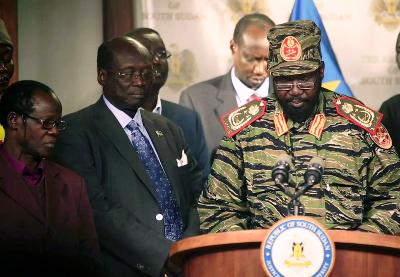S. Sudan’s Kiir says ready for dialogue with Machar
December 19, 2013 (JUBA) – The South Sudanese President Salva Kiir is ready for dialogue with his former deputy, Riek Machar whom he accused of masterminding Sunday’s coup attempt in the capital, Juba.

The president, on Monday, blamed the skirmishes on forces allegedly loyal Machar, which the latter denied in an exclusive interview with Sudan Tribune.
“There was no coup. What took place in Juba was a misunderstanding between presidential guards within their division. It was not a coup attempt. I have no connection with or knowledge of any coup attempt”, said Machar.
He claimed that no official from the ruling Sudan People’s Liberation Movement (SPLM) had any connection with the alleged coup.
The United Nations Secretary General, in a phone interview with Kiir, expressed deep concerns about the current situation in South Sudan
“I spoke to President Salva Kiir yesterday morning, urging him to do everything possible he can to end the violence and to ensure respect for human rights and the rule of law”, Ban Ki Moon said in a statement.
“Am impressed on him the need to resume dialogue with the political opposition”, he added, in reference to reports that Kiir was willing to talk with his opponents.
Hilde Johnson, the special representative of the Secretary General also called for urgent political dialogue in the country.
“This is a political crisis, and urgently needs to be dealt with through political dialogue. There is a risk of this violence spreading to other states, and we have already seen some signs of this,” she said.
It is essential to protect the human rights of all those who are detained, Johnson stressed in a statement.
The UN Mission in South Sudan said it has received reports of many people being killed and injured, with nearly 20,000 people reportedly displaced.
“We are in the process of verifying the reports”, the UN said, raising possible fears of more displaced people in its Jonglei state.
CONFLICT POLITICAL NOT ETHNIC
President Kiir said that the infighting between members of the army is a political power struggle, strongly denying that it is an ethnic conflict.
“It is not true that what happened is a conflict between tribes. This is a politically power struggle and it should be taken in this context. Why it should be a problem between Dinka and Nuer when there are more than 60 tribes in South Sudan”, Kiir told reporters at Wednesday’s news conference.
Dressed in civilian dress, in contrast to military fatigues he donned on Monday, Kiir said that the army was hunting for those whom he claims had attempted to depose him and his administration.
Eleven senior members of the ruling party have been detained, while some others alleged to be involved in conspiring against him, including his former deputy Riek Machar, remain at large. But Kiir said he was open to dialogue.
“There is no problem. I will sit down with him so that we talk. As to the outcome of the talks, I will not be able to tell you”, Kiir told journalists.
James Kok Ruei, a former minister of humanitarian Affairs and disaster Management, himself a member of the Nuer tribe, echoed Kiir’s claimed that the administration was not targeting individuals based on ethnic backgrounds.
“What happened in Juba is not a tribal conflict. It was an attempt by individuals to forcefully remove the democratically elected government in 2010. If there is a need for change, the people will come again and ask you to vote for people you would like to be your leaders without having to use force and violence”, Ruei said on Thursday.
President Kiir’s spokesman Ateny Wek Ateny told Sudan Tribune Tuesday that what happened was “a coup attempt”, asserting that the group had tried to move close to the headquarters of the national television and the military barracks as well as making a push towards presidential palace.
“It was an attempted coup. They tried going to the national radio and television but this move was resisted. What can you say it was if it was not a coup attempt”, Ateny asked.
He downplayed fears that the current unrest could lead to the full blown out civil war, asserting that no-one was “targeting ethnic groups”, although they may have killed in the “cross fire”.
Diplomatic missions to Juba have issued statements cautioning the movement of their citizens some of which have already pulling out some of its non-essential staff out of capital Juba due to the “current instability”. The United States has suspended embassy operations and on Wednesday flew out 120 staff, including 28 foreign diplomats on two aircraft.
South Sudan Foreign Affairs Minister, Barnaba Marial Benjamin said security situation in and outside Juba was quickly getting under control that it was no need for foreign offices in the country to move out their representatives while security is getting back to normal.
Meanwhile Information Minister Micheal Makuei Lueth confirmed for the first time since the eruption of violence on Sunday that at least 500 people, mostly soldiers, had been killed “in and” around Juba.
(ST)
